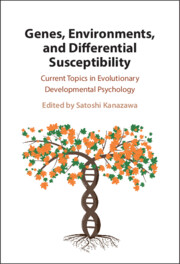 Genes, Environments, and Differential Susceptibility
Genes, Environments, and Differential Susceptibility Book contents
- Genes, Environments, and Differential Susceptibility
- Genes, Environments, and Differential Susceptibility
- Copyright page
- Contents
- Figures
- Tables
- Contributors
- Introduction
- Part I Historical Background and Theoretical Foundations of Jay Belsky’s Work in Evolutionary Developmental Psychology
- Part II Parent–Child Relations and Attachment
- Part III Life-Course Development from Prenatal Environment through Childhood to Adulthood
- Part IV Differential Susceptibility to Environmental Influences
- Conclusion
- Afterword
- Biography of Jay Belsky
- Index
- References
Conclusion
Science, Politics, and the Two Universal Laws of Human Behavior
Published online by Cambridge University Press: 04 September 2025
- Genes, Environments, and Differential Susceptibility
- Genes, Environments, and Differential Susceptibility
- Copyright page
- Contents
- Figures
- Tables
- Contributors
- Introduction
- Part I Historical Background and Theoretical Foundations of Jay Belsky’s Work in Evolutionary Developmental Psychology
- Part II Parent–Child Relations and Attachment
- Part III Life-Course Development from Prenatal Environment through Childhood to Adulthood
- Part IV Differential Susceptibility to Environmental Influences
- Conclusion
- Afterword
- Biography of Jay Belsky
- Index
- References
Summary
From Galileo, Darwin, to Belsky, the history of science is rife with examples of strong public opposition to new, revolutionary ideas, but not all new, revolutionary ideas attract similarly negative and strong reactions. The conclusion offers speculations about what such strong public oppositions to new scientific ideas might mean, and what they might tell us about the likely eventual success of such new scientific ideas. The conclusion proposes two universal laws of human behavior, which might explain why some scientific ideas and conclusions might elicit strong negative reactions.
Information
- Type
- Chapter
- Information
- Genes, Environments, and Differential SusceptibilityCurrent Topics in Evolutionary Developmental Psychology, pp. 251 - 258Publisher: Cambridge University PressPrint publication year: 2025
References
Accessibility standard: WCAG 2.0 A
Why this information is here
This section outlines the accessibility features of this content - including support for screen readers, full keyboard navigation and high-contrast display options. This may not be relevant for you.Accessibility Information
Content Navigation
Allows you to navigate directly to chapters, sections, or non‐text items through a linked table of contents, reducing the need for extensive scrolling.
Provides an interactive index, letting you go straight to where a term or subject appears in the text without manual searching.
Reading Order & Textual Equivalents
You will encounter all content (including footnotes, captions, etc.) in a clear, sequential flow, making it easier to follow with assistive tools like screen readers.
You get concise descriptions (for images, charts, or media clips), ensuring you do not miss crucial information when visual or audio elements are not accessible.
You get more than just short alt text: you have comprehensive text equivalents, transcripts, captions, or audio descriptions for substantial non‐text content, which is especially helpful for complex visuals or multimedia.
Visual Accessibility
You will still understand key ideas or prompts without relying solely on colour, which is especially helpful if you have colour vision deficiencies.
You benefit from high‐contrast text, which improves legibility if you have low vision or if you are reading in less‐than‐ideal lighting conditions.